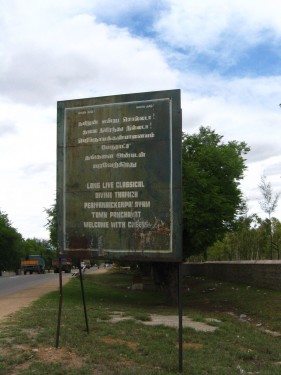calque
noun
definition 1: a word adopted into one language from another through the translation of each root or morpheme of the foreign word.
example: In English, the word “masterpiece” is a calque of the Dutch word “meesterstuk.” In French, the word “gratte-ciel” is a calque based on the translation of the words “scrape” and “sky” in the English compound word “skyscraper.”
Explanation and an unexpected foray into “language devotion”
Calques are sometimes called “loan translations” and, like loanwords, are words that one language borrows from another. Loanwords, however, come into a language more or less as they are, albeit with modifications in spelling and pronunciation so that they follow the linguistic rules of the borrowing language.
In searching for zesty new calques to sprinkle over this post, I came across one, mugaputhagam, which, unfortunately, is difficult to present in isolation from a fairly complicated historical and political context that I could not possibly do justice to here. I found the word in a Times of India article about the creation of a new Tamil language dictionary at the University of Madras, in Tamil Nadu, one of two southern Indian states where Tamil is spoken. Tamil is a classical Dravidian language that goes back 2,000 years. It is not, as Hindi is, a national language of India, and a Tamil language pride movement has been in existence since the early nineteenth century. Tamil language pride is intertwined with ethnic (and in Sri Lanka, nationalist) politics, as well as by the desire to preserve a cultural heritage. Every language has its purists; with a living language that existed when Latin was still spoken, the impulse to preserve and protect the language from the influence (“corruption”) of more dominant, possibly hostile languages and cultures is understandable. The Tamil dictionary project team aims for inclusiveness and balance. It will draw on the neglected canon of Tamil texts, but also reflect Tamil as it is spoken and written in the present.
Inclusion of new words and borrowings has provoked objections from Tamil poets and scholars. The calque mugaputhagam elicited this remark from Tamil poet Manushya Puthiran:
“There is nothing wrong in creating new words for conceptual terms. But it is ridiculous to call Facebook ‘mugaputhagam.’ A new word must emerge from the roots and not as a mere translation.” (Times of India, Chennai)
Unfortunately, these words, which, without historical context and within the complacency of American citizenship, might raise a smile, are the tip of a dark and deep iceberg. Harold Schiffman, Professor Emeritus of Southeast Asian Languages at the University of Pennsylvania, writes:
By one objective measure, such as willingness to sacrifice one’s life for the language, the Tamils surely rank near the top: by documented estimates, at least 9 Tamils have voluntarily given their lives for their language during various demonstrations and actions during the last four decades (Ramaswami 1997:1) and unofficially, the loss of life by Tamils fighting for an independent Tamil Eelam in Sri Lanka ranks very high. In fact the invocation `remember the martyrs!’ is often used whenever enthusiasm for Tamil causes is seen to be flagging, and can penetrate even discussions of how to encode Tamil characters in Unicode, a debate one might consider essentially devoid of potential emotional content. (Schiffman)
In future posts, we’ll get back to questions of how new words arise (and have arisen) in English, for learning about the origin of words, and the processes by which words are borrowed into, or formed within, English, can have great practical effects on vocabulary learning and comprehension.


